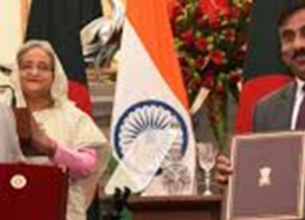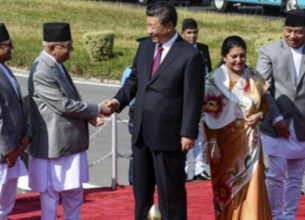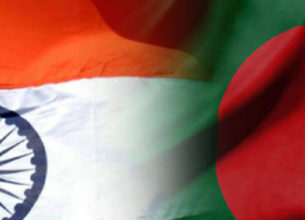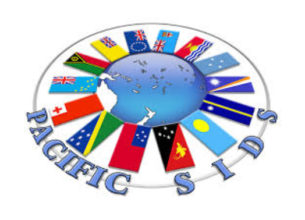INDIA SHOULD NOT HAVE JOINED U.S. BAN, SAYS IRAN
Context:
- India’s decision to shut down oil imports from Iran due to sanctions imposed by the United States is also hurting India-Iran bilateral trade and India’s future in Chabahar port, said Iranian Ambassador to India Ali Chegeni.
Background:
- India stopped crude oil imports from Iran on 2 May after the US sanctions.
- Last year, US President Donald Trump had walked out of the 2015 Iran nuclear deal, signed between Iran and six countries representing the international community.
Indian stand on Sanctions:
- India, which says that it only recognizes United Nations-mandated sanctions and not those imposed by specific countries, has been adhering to the US sanctions as they target public and private companies doing business with Iran.
China on US Sanctions:
- China was not adhering to the US-imposed sanctions and had agreed to invest $280 billion in Iran’s oil, gas and petrochemical sectors that are being affected by US sanctions.
- In return, Iran will grant Chinese companies’ priority in tenders for any new or incomplete projects to develop oil and gas fields, as well as petrochemical projects.
India Iran oil Relationship:
- Iran has always been one of India’s main suppliers of oil, second only to Iraq and Saudi Arabia, with exports that totalled more than 27 million tonnes last year.
Local Currency:
- There is the option of trading in local currencies to pay for oil that India buys from Iran, or doing barter trade, that is, Tehran will buy goods from India in return for the oil that its exports without paying a cent.
India US Concern Issue:
- With the US pushing India to end its oil trade with Tehran and New Delhi unwilling to jeopardize its rapidly warming ties with Washington, it was clear that India would steer clear of buying oil from Iran. The US had also helped India get Pakistan-based Jaish-e Mohammed terrorist group chief Maulana Masood Azhar listed as a terrorist under UN norms and had made it clear that it expected reciprocity.
- The US has exempted Indian investments in Chabahar from sanctions given that New Delhi sees it as a gateway to Afghanistan but Indian companies, fearful of possible repercussions of investing in Iran, have stayed away.
Iran’s stand on Issue:
- Iran says that the countries followed their national interests but he also underlined that India had followed an independent foreign policy that would allow it to take independent decisions.
Similar issue in 2012:
- In 2012, when the Obama administration wanted to maximise pressure on Iran in order to secure the nuclear deal or the Joint Comprehensive Plan Of Action, it had sent a similar tough message to New Delhi, albeit more discreetly than the Trump administration has.
- India agreed to cut oil imports by 15% subsequently, but asserted its autonomy.
- Rupee-Rial Mechanism
- New Delhi operationalised a ‘rupee-rial’ mechanism, under which half of what it owed Tehran for oil imports would be held in a UCO Bank account and made available to Iranian companies to use for any imports from India, an arrangement the Narendra Modi government is seeking to re-energise.
How Situation is different from 2012
- But 2019 is not 2012, and the stakes are higher for the government.
- Ties with the U.S. are under strain over several issues, including U.S. trade tariffs and India’s defence procurement from Russia, and a major divergence on Iran will exacerbate the problem with India’s biggest trading partner and fastest growing defence partnership.
- Moreover, in an increasingly globalised world, where Indian companies compete, any U.S. sanctions will make it hard for refiners, insurers and transport companies to facilitate oil trade, even if India wishes to continue it.
- On the other hand, India’s investment in the Iranian relationship has increased, making a turnaround much more difficult.
- New Delhi rolled out the red carpet for Iran’s President Hassan Rouhani and committed itself to increasing its oil off-take by 25% this year, as part of easing negotiations for the Farzad-B gas fields India is keen to buy a stake in.
- India has also committed itself to investing $500 million to build berths at Chabahar’s Shahid Beheshti Port, and $2 billion to build a rail line through the Zahedan province to Afghanistan, in an effort to circumvent trade restrictions by Pakistan.
- Iran’s other oil importers, China and Turkey, have said they will not accept the U.S.’s diktat.
India Iran projects:
Chabahar Port:
- India is helping develop the Chabahar Port, which will give it access to the oil and gas resources in Iran and the Central Asian states.
- By so doing, India hopes to compete with the Chinese, who are building Gwadar Port, in Pakistan’s Balochistan.
Zaranj Delaram Highway:
- A Highway between Zaranj and Delaram is being built with financial support from India.
North South Transport corridor:
- The North–South Transport Corridor is the ship, rail, and road route for moving freight between India, Russia, Iran, Europe, the Caucasus, and Central Asia. The route primarily involves moving freight from India, Iran, Azerbaijan and Russia via ship, rail and Road.











